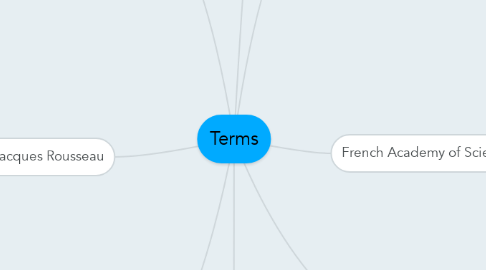Terms
by Anja Bacalla

1. Jean-Jacques Rousseau
1.1. (1712-1778): 18th century Genevan political philosopher who influenced Enlightenment thinking in France and in the rest of the western world and is considered one of the founders of modern liberal democratic theory; He is best known for his two works, Discourse on Inequality (1754) and The Social Contract (1762), which are considered milestones in the development of modern sociology and political philosophy; He is also credited with expanding the social contract theory, which is idea that the state only has legitimacy over people if and when it preserves the peoples’ rights and security, and if the state cannot preserve peoples’ security and rights, the people have a right to revolt and create a new state; Rousseau’s philosophy is significant as it is one of the direct inspirations behind the American Revolution and the French Revolution, and the development of modern political philosophy and western liberal democratic ideals.
2. Adam Smith
2.1. (1723-1790): 18th century Scottish moral philosopher who influenced Enlightenment thinking in Great Britain and the rest of the western world and is considered the father of modern economics; He is best known for his work, Wealth of Nations (1776), which is often considered the basis for modern capitalist economics; His view on markets, private property, and the rational self-interest of individuals has had a significant influence on the study of economics and the development of public policy.
3. Maximillian Robespierre
3.1. 1758-1794): 18th century French politician who was considered a leading figure of the French Revolution and the Reign of Terror. As a member of the Jacobin Club, a radical left-wing social group that advocated for the overthrow of the monarch and the establishment of republican ideals in France, he quickly became known as one of the French Revolution’s most radical leaders and advocated for the use of terror to protect and advance the Enlightenment ideals of the revolution. After the Jacobins lost control of the National Assemble in 1794, Robespierre was executed along with other Jacobin leaders.
4. Reign of Terror
4.1. (1793-1794): the bloodiest period of the French Revolution; this period marked a massive increase in the number of people being guillotined and summarily executed as the Jacobins, a radical left-wing faction that advocated republicanism and Enlightenment philosophy, took control of the government and began to use its powers to purge their political rivals and all those considered enemies of the revolution; the Jacobin controlled National Assembly formed the Committee of Public Safety as the actual organ of the national government that was headed by Maximillian Robespierre and other Jacobin leaders that were tasked with arresting and summarily executing all those accused of being counterrevolutionaries; This period ended when the Jacobin’s lost control of the National Assembly and the leadership of the Jacobins was executed; This period was significant as it is considered the bloodiest and most radical period of the Revolution.
5. Seven Years War
5.1. (1754-1763): last major European imperial war fought amongst the British Empire, French Empire and all of their respective European imperial allies; this war is often called the first real “world war” because it raged on 5 continents (Western Europe, North America, South America, West Africa, and India) and included all of the major European global powers; This war is VERY significant in the development of global politics and international relations as it tipped the European balance of power in favor of the British Empire, who became the global superpower and acquired the territories of New France in North America, Spanish Florida, the West Indies, and former French trading posts in West Africa and the Caribbean; This war also served as one of the leading events to the American Revolutionary War as it greatly expanded Britain’s territorial domain in British North America.
6. Royal Society of England
6.1. established in November of 1660; this learned society was established via royal charter by King Charles II as community of Britain’s greatest intellectual minds that sought to promote the advancement of science; members included Sir Isaac Newton, Robert Hooke, Edmond Halley, Francis Bacon, etc.; the Royal Society is also significant in the development of the Age of Enlightenment and the Scientific Reason as it provided a venue for Europe’s greatest scientific and philosophical minds to discuss controversial and iconoclastic ideas without interference of the Crown or the Church.
7. French Academy of Science
7.1. established in 1660; this learned society was similar to its British counterpart, the Royal Society of England, as it was established via royal charter by King Louis XIV at the suggestion of Jean-Baptiste Colbert as community of France’s greatest intellectual minds that sought to promote the advancement of science; Unlike the Royal Society of England, however, this learned society was actually a political organ of the state and was meant to advise the king on matters of science, mathematics, and philosophy; this learned society is also significant as comparison of the absolutist versus constitutionalist powers of the monarch and that power’s influence on the development of science and philosophy in the 17th and 18th century.
8. Fredrich Engles
8.1. (1820-1895): 19th century German philosopher and social scientist; Engels is best known for developing Marxist Theory with Karl Marx; He is best known for coauthoring two important works of Marxist theory, The Communist Manifesto (1848) and Das Kapital (1867-1883), with Karl Marx; Engels’ theories on class struggle within Marxist theory have had a lasting legacy that has significantly influenced politics, economics, philosophy, sociology, and history for much of the 20th and 21st century.


